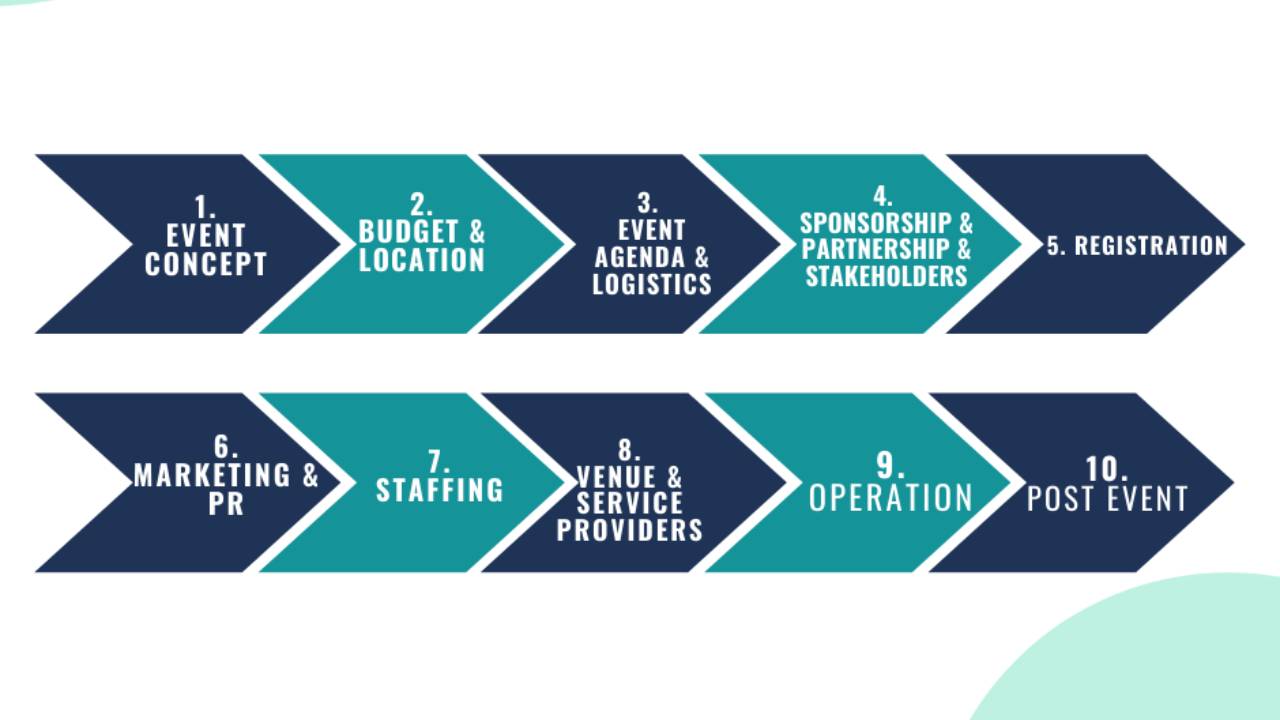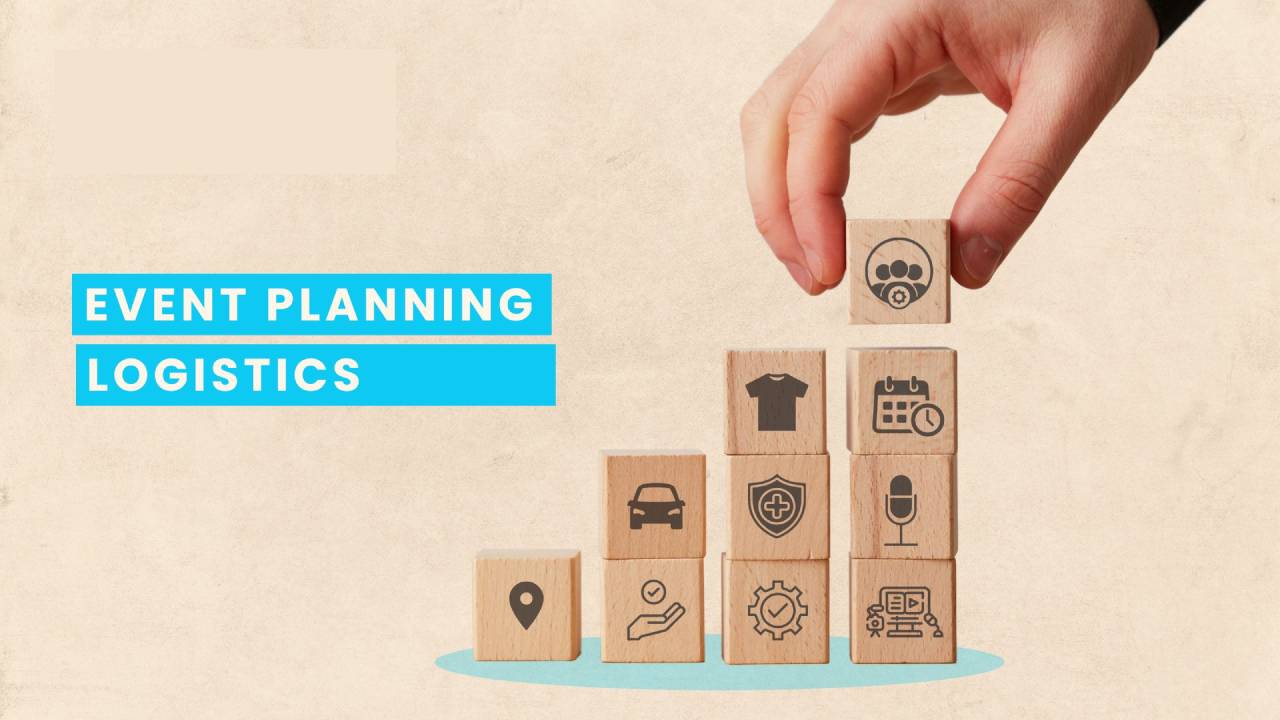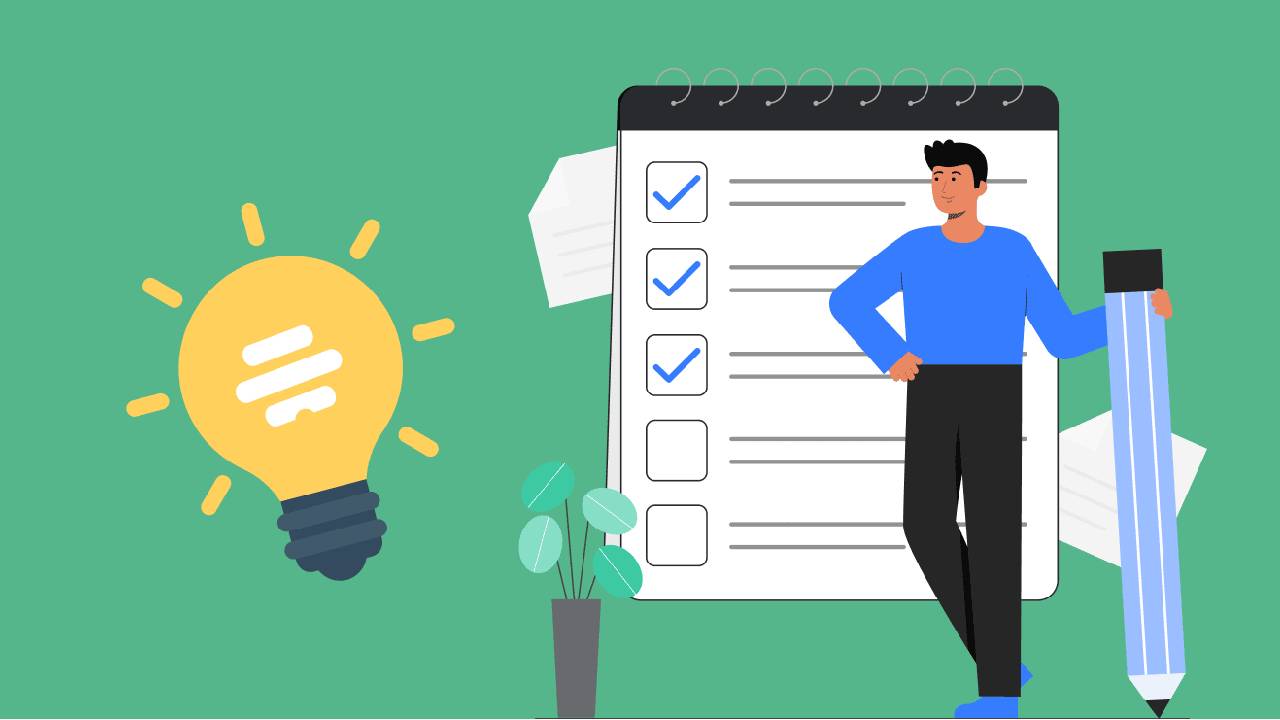Welcome to the ultimate guide to event planning: “From Concept to Execution.” In this extensive resource, we’ll plunge into the exhilarating universe of event arranging, where the creative mind meets precision to make striking experiences. Occasion arranging isn’t just about setting up a party; a careful interaction rejuvenates thoughts.
From weddings and corporate meetings to local meetings and festivities, occasion planning plays a vital part in making these minutes significant. However, what precisely is occasion arranging, and for what reason is it so fundamental?
We should set out on this excursion to investigate the flighty nuances of event organization, from thought to execution, and find the key parts that make it a magnum opus in itself.
Key Steps in Event Planning

The journey of event planning is guided by a series of essential steps that transform ideas into reality. These key steps serve as the foundation for creating successful and memorable events.
From defining the event’s purpose and goals to crafting a budget, creating a timeline, selecting the perfect venue, designing a theme, managing guest lists, and organizing everything from catering to entertainment and marketing, each step is a critical building block.
In this part, we’ll investigate these crucial parts of occasion planning, offering significant experiences and occasion planning tips to guarantee your occasion accomplishes its goals and has an enduring effect on participants.
Defining the Event’s Purpose and Goals:
As a matter of some importance, the first step in occasion arranging is to characterize the reason and objectives of your occasion, obviously.
Ask yourself: What is the primary goal of this occasion?
Whether it’s an item send-off, a wedding festivity, a foundation pledge drive, or a corporate meeting, having a completely clear comprehension of why you’re sorting out the occasion will direct the entirety of your choices pushing ahead.
Your objectives could incorporate bringing issues to light, producing leads, making a noteworthy encounter, or just praising an extraordinary event. Being specific about your objectives will help you tailor the entire event to achieve them.
Budgeting for Your Event:
Budgeting is the foundation of successful event planning. It’s indispensable to decide the amount you’re willing to spend and designate assets for various parts of your occasion. Make a nitty-gritty financial plan that takes care of everything from scene expenses to enhancements and diversion.
Be sure to account for unexpected expenses by setting aside a contingency fund. Staying within your budget ensures financial stability throughout the planning process and prevents unpleasant surprises down the road.
Creating a Timeline:
Time management is crucial in event planning. Foster an exhaustive timetable that frames every one of the undertakings and achievements paving the way to the occasion. This timetable will act as your guide, keeping you on target and guaranteeing that nothing becomes lost despite any effort to the contrary.
Include deadlines for tasks like sending out invitations, booking vendors, and finalizing event details. Having a well-structured timeline will help you manage your time efficiently and reduce last-minute stress.
Selecting the Right Venue:
The choice of venue can greatly impact the atmosphere and success of your event. Consider factors such as the location, size, layout, and amenities when selecting a venue. It should align with the event’s theme and accommodate your expected guest count comfortably.
Additionally, think about accessibility and parking for attendees. Once you’ve found the perfect venue, secure the date and contract promptly to avoid scheduling conflicts.
Read Also: Creative Custom Pennants: Perfect Decor for Any Occasion
Event Theme and Concept:
Infuse your event with personality and style by selecting a theme and concept that resonate with your audience and purpose.
Whether it’s a tropical luau, a vintage Hollywood gala, or a tech-driven conference, your theme sets the tone for the entire event. It dictates everything from the decorations and dress code to the choice of entertainment.
Ensure that your theme aligns with your event’s objectives and appeals to your target audience, making it a memorable and cohesive experience.
Guest List and Invitations:
Crafting a thoughtfully curated guest list is essential to ensure that the right people attend your event. Determine your target audience and create an invitation list that includes key stakeholders, clients, friends, family, or specific demographics, depending on your event’s purpose.
Once your guest list is finalized, design and send out invitations well in advance, providing guests with all the necessary details, including date, time, location, and RSVP instructions.
Catering and Food Options:
Food is a significant aspect of any event. Depending on your event’s formality and style, choose a catering option that suits your budget and guest preferences.
Consider dietary restrictions and allergies when planning the menu. Whether it’s a buffet, a plated dinner, or a variety of food stations, make sure the culinary experience adds to the overall enjoyment of the event.
Entertainment and Activities:
Diversion can be a feature of your occasion, keeping visitors drawn in and making paramount minutes. Contingent upon your financial plan and subject, you can settle on unrecorded music, DJs, performers, photograph stalls, or different types of diversion.
Exercises ought to line up with your occasion’s objectives, whether it’s group-building practices for a corporate occasion or games and exercises for a get-together. Ensure that your chosen entertainment complements the overall atmosphere.
Decor and Design:
Decorations and design elements transform your event space and enhance its visual appeal. Coordinate decorations with your chosen theme, using colors, lighting, centerpieces, and signage to create a cohesive and inviting ambiance.
Pay attention to small details that can make a big difference, such as table settings and floral arrangements. A well-designed event space can leave a lasting impression on your guests.
Event Promotion and Marketing:
To guarantee that your occasion contacts its target group, put time and effort into occasion advancement and advertising. Use different channels, including virtual entertainment, email showcasing, and customary publicizing, to make buzz and produce interest.
Encourage early registration or ticket sales to secure attendance. Effective promotion will help you maximize attendance and the impact of your event.
Event Logistics

Event logistics are the backbone of a smoothly executed gathering. This crucial aspect of event planning focuses on the nitty-gritty details that ensure everything runs seamlessly.
From setting up the event space to managing registrations, coordinating technology, handling transportation, and ensuring security, event logistics play a vital role in creating a hassle-free and enjoyable experience for attendees.
In this section, we’ll delve into the intricacies of event logistics, offering valuable event planning tips to help you orchestrate a memorable and well-organized event from start to finish.
Event Setup and Layout:
The setup and layout of your event space are like the canvas upon which your event unfolds. Consider the flow of the space, how different areas will be utilized, and the placement of key elements such as stages, booths, or seating arrangements.
Create a detailed floor plan and collaborate closely with the venue staff to ensure that your vision comes to life. The setup should not only be aesthetically pleasing but also practical for your event’s activities and objectives.
Registration and Check-In:
Efficient registration and check-in processes are crucial for a hassle-free start to your event. Utilize user-friendly online registration platforms and have a streamlined check-in system in place.
Staff or volunteers should be well-trained to handle registrations smoothly, ensuring that attendees receive their badges, materials, or access passes promptly. A smooth check-in experience sets a positive tone for your event.
Audio-Visual and Technology:
In today’s tech-savvy world, audio-visual (AV) and technology elements are central to any event. Ensure that you have the right AV equipment, including microphones, projectors, and screens, to facilitate presentations and communication.
Test all equipment well in advance to avoid technical glitches. Consider providing Wi-Fi access for attendees and use event apps or software to enhance engagement and communication during the event.
Transportation and Parking:
Convenient transportation options and parking arrangements are essential to ensure that attendees can access your event without hassle.
Give clear data on stopping areas and transportation choices, like transport or public travel. On the off chance that your occasion setting is in a high-traffic region, consider planning with nearby specialists to oversee the traffic stream and stop.
Security and Emergency Plans:
Safety should always be a top priority in event planning. Develop comprehensive security and emergency plans in collaboration with venue security personnel and local authorities.
Identify potential risks and establish protocols for handling emergencies, including medical situations and evacuations. Ensure that your staff or volunteers are trained to respond appropriately to any security or safety issues that may arise.
Vendor Management

Vendor management is a pivotal aspect of successful event planning. It involves working with various suppliers and partners to bring your event vision to life.
In this section, we’ll delve into the intricacies of vendor management, covering essential tasks such as selecting event suppliers, negotiating contracts, maintaining effective communication, and managing payments and invoices.
These event planning tips will guide you in building strong relationships with your vendors, ensuring that every element of your event aligns seamlessly to create a memorable experience.
Choosing Event Suppliers:
Selecting the right event suppliers is like assembling a dream team to support your event. Identify vendors who align with your event’s theme, goals, and budget.
Whether it’s a caterer, a florist, a photographer, or an audio-visual technician, choose suppliers with a track record of excellence and reliability. Request proposals, review portfolios, and seek recommendations to make informed decisions.
Negotiating Contracts:
Contracts serve as the foundation of your vendor relationships, outlining expectations, responsibilities, and terms of agreement.
Negotiate contracts carefully, ensuring they cover all essential details, such as services, costs, timelines, and cancellation policies. Clarify any uncertainties and ensure both parties are on the same page before signing. A well-structured contract provides peace of mind and legal protection for all parties involved.
Coordination and Communication:
Effective coordination and communication with your vendors are key to a successful partnership. Maintain open lines of communication throughout the planning process, addressing questions, concerns, and updates promptly.
Create a master schedule that outlines each vendor’s role and responsibilities, ensuring everyone is aware of their tasks and deadlines. Regular meetings and check-ins keep everyone aligned and on track.
Payments and Invoices:
Managing payments and invoices is a critical part of vendor management. Stick to your budget by tracking expenses and ensuring that payments are made on time.
Set up a clear payment schedule with vendors, and keep records of all financial transactions. Verify that all invoices are accurate and match the terms of the contract. Timely payments and transparent financial management foster trust and reliability among your vendors.
Day-of-Event Execution

The day your event unfolds is the culmination of meticulous planning and preparation. In this section, we’ll explore the critical aspects of day-of-event execution, where event planning truly comes to life.
From assembling your event team and managing the schedule to adeptly handling unexpected issues and keeping your guests informed, these event planning tips ensure a smooth and memorable experience for everyone involved.
Event Staffing and Roles:
Your event’s success hinges on having a well-coordinated team with clearly defined roles. Ensure that your event staff understands their responsibilities and is equipped with the necessary resources.
Assign roles such as event coordinator, greeter, technical support, and emergency responders. Regularly communicate and provide training to address any last-minute concerns or changes.
Managing the Schedule:
A well-structured schedule is the backbone of a seamless event. Adhere to the timetable you made during the arranging stage, making changes depending on the situation. Watch out for the timetable to guarantee that movements of every sort, introductions, and changes happen without a hitch.
Handling Unexpected Issues:
Even with meticulous planning, unexpected issues can arise during an event. Stay calm and be prepared to tackle challenges as they come.
Create a contingency plan to address common issues, such as technical glitches or weather-related concerns. Empower your event staff to make quick decisions and resolve issues swiftly, ensuring minimal disruption to the event.
Keeping Guests Informed:
Effective communication with your guests is essential on the day of your event. Display clear signage and directions to guide attendees throughout the venue.
Use announcements, event apps, or digital displays to provide real-time updates and important information. Address any questions or concerns promptly to keep guests comfortable and informed, enhancing their overall experience.
With a well-orchestrated approach to day-of-event execution, you can turn your event planning vision into a memorable reality. Ensuring that your team is well-prepared, the schedule is meticulously managed, unexpected issues are handled with grace, and guests are kept informed will contribute to a successful and enjoyable event for all.
Post-Event Activities

The completion of your event doesn’t mark the end of the event planning journey; instead, it opens a new chapter of post-event activities.
In this section, we’ll explore the crucial tasks that come after your event, including post-event evaluation, collecting feedback, expressing gratitude to participants and partners, and wrapping up financial matters.
These event planning tips ensure that you learn from your event’s success and areas for improvement, maintain valuable connections, and conclude your event with financial clarity.
Post-Event Evaluation:
After the excitement of your event, take the time to conduct a thorough post-event evaluation. Reflect on what went well and what could be improved.
Analyze your event’s objectives and whether they were met. Review attendee statistics and feedback. This evaluation serves as a valuable learning tool for future event planning endeavors.
Collecting Feedback:
Gathering feedback from attendees is a vital step in improving future events. Create surveys or feedback forms to collect insights on various aspects of the event, from the overall experience to specific sessions or activities.
Analyze the feedback to understand attendee perspectives, identify areas for enhancement, and gauge overall satisfaction.
Thanking Participants and Partners:
Gratitude goes a long way in event planning. Show appreciation to participants, sponsors, speakers, and partners who contributed to the success of your event.
Send personalized thank-you notes or emails, acknowledging their support and involvement. Recognizing their efforts strengthens relationships and encourages future collaboration.
Wrapping Up Financials:
Concluding the financial aspect of your event is crucial for maintaining financial clarity. Review all financial transactions, including income and expenses.
Ensure that all invoices are settled, and financial records are reconciled. Prepare a final financial report that outlines the event’s financial status, helping you assess its profitability and plan for future budgeting.
By executing these post-event activities as part of your event planning process, you not only gain valuable insights for future events but also express appreciation to those who contributed to your event’s success. It’s the final touch that ensures a well-rounded and organized event-planning experience from beginning to end.
Event Planning Tools and Software

In the modern world of event planning, technology has become an indispensable ally. This section explores the world of event planning tools and software, offering a glimpse into the digital resources that can streamline your event management process.
From comprehensive event management software to user-friendly event planning apps and a wealth of online resources and templates, these digital companions are designed to make your event planning journey more efficient and organized.
Event Management Software:
Event management software is a powerful tool that simplifies and streamlines the intricate process of planning and executing events of all sizes and types.
These platforms provide event planners with a centralized hub to manage multiple aspects of their events, from registration and ticketing to marketing, logistics, and reporting. Here’s a closer look at the features and benefits of event management software, along with some popular software suggestions:
Key Features and Benefits:
- Registration and Ticketing: Event management software allows you to create customized registration forms and ticketing options. Attendees can easily register online, select tickets, and receive confirmation emails.
- Attendee Management: You can efficiently manage your attendee database, track RSVPs, and communicate with participants through the software. This helps in sending updates, event reminders, and post-event surveys.
- Payment Processing: Most event management software solutions offer integrated payment processing, allowing you to securely collect payments for ticket sales, sponsorships, and merchandise.
- Event Marketing: Promoting your event becomes more manageable with marketing features such as email campaigns, social media integration, and promotional tools. You can create landing pages, send targeted emails, and track the effectiveness of your marketing efforts.
- Agenda and Session Management: For conferences and multi-session events, event management software helps you create and manage event agendas, schedules, and session details. Attendees can view and register for specific sessions.
- Event Check-In: Streamline on-site check-in and badge printing with the software’s check-in tools. This reduces long lines and ensures a smooth entry experience for attendees.
- Analytics and Reporting: Comprehensive analytics and reporting tools allow you to track attendance, measure the success of your event, and gather insights for future improvements.
Popular Event Management Software:
- Eventbrite: Eventbrite is a widely used event management platform suitable for events of all sizes. It offers robust registration, ticketing, and promotion features.
- Cvent: Cvent is a comprehensive event management software used for large conferences and corporate events. It includes tools for event marketing, attendee management, and venue sourcing.
- Regpack: Regpack is a registration and payments management software that can be customized to fit the specific needs of your event, making it suitable for various types of gatherings.
- Whova: Whova specializes in event networking and attendee engagement. It provides features for event promotion, virtual event hosting, and attendee interaction.
- Aventri (formerly etouches): Aventri is an end-to-end event management platform with features for event registration, mobile apps, and reporting. It’s suitable for large-scale conferences and exhibitions.
- Splash: Splash is known for its stylish event pages and branding capabilities. It’s great for creating visually appealing event websites and invitations.
Choosing the right event management software depends on the specific needs and scale of your event. These tools can save you time, reduce administrative overhead, and enhance the overall attendee experience, making them valuable assets for event planners.
Useful Event Planning Apps:
Event planning apps are invaluable tools that empower event organizers to manage various aspects of their events efficiently, right from their smartphones or tablets.
These apps offer a wide range of features to help streamline tasks, enhance communication, and ensure that everything runs smoothly on the day of the event. Here, we’ll explore the key features and benefits of event planning apps, along with some popular app suggestions:
Key Features and Benefits:
- Mobile Check-In: Event planning apps often include mobile check-in features, allowing you to scan attendee tickets or QR codes at the event entrance. This reduces waiting times and enhances the check-in experience for attendees.
- Real-Time Updates: Keep your team and attendees informed with real-time updates and notifications. You can send important announcements, schedule changes, or emergency alerts directly through the app.
- Attendee Engagement: Engage your attendees by offering interactive features such as live polls, surveys, and Q&A sessions. Event planning apps facilitate two-way communication, encouraging active participation.
- Networking: Many apps offer networking features that help attendees connect with each other. Attendees can browse profiles, schedule meetings, and exchange contact information, fostering valuable connections.
- Agenda Access: Provide attendees with easy access to event agendas, session details, and speaker information. They can personalize their schedules and receive reminders for upcoming sessions.
- Event Maps: Event planning apps often include interactive maps to help attendees navigate the event venue. You can highlight key areas, exhibitor booths, and session locations.
- Feedback Collection: Gather feedback from attendees through surveys and polls within the app. This data is valuable for assessing the event’s success and making improvements for future events.
Popular Event Planning Apps:
- Bizzabo: Bizzabo’s mobile app complements its web platform and offers networking features, agenda access, and attendee engagement tools.
- MeetApp: MeetApp is a versatile event app with a focus on attendee engagement. It includes networking, interactive sessions, and agenda customization.
- ZapEvent: ZapEvent’s mobile app is designed for smaller-scale events and offers features for online registration, check-in, and communication with attendees.
- Grenadine Events: Grenadine Events offers both web-based event management and a mobile app for attendees. It provides schedule access, real-time updates, and interactive features.
Selecting the right event planning app depends on the specific needs and goals of your event. These apps are designed to enhance attendee engagement, streamline logistics, and improve overall event management, making them valuable tools for event organizers.
Tips for New Event Planners

Embarking on a career in event planning can be both exciting and challenging. This section offers valuable tips for new event planners, providing guidance on building a successful career in event planning, staying organized, and managing stress effectively to ensure a smooth journey in the world of event planning.
Building a Career in Event Planning:
- Education and Training: Consider pursuing courses or certifications in event planning to gain essential knowledge and skills. These programs can provide a strong foundation for your career.
- Networking: Building a network of industry contacts is crucial. Attend events, join professional associations, and connect with mentors who can offer guidance and opportunities.
- Internships and Volunteer Work: Gain practical experience through internships or volunteer opportunities. This hands-on experience will help you understand the nuances of event planning.
- Start Small: Begin your career by working on smaller events to build your portfolio and gain experience. As you grow, you can take on larger and more complex projects.
- Specialize: Consider specializing in a particular type of event planning, such as weddings, corporate events, or non-profit fundraisers. Specialization can set you apart in the field.
Staying Organized and Stress-Free:
- Event Planning Software: Use event planning software and apps to stay organized. These tools can help with tasks like budgeting, guest list management, and timelines.
- Detailed Checklists: Create comprehensive checklists for each event. Break down tasks into smaller steps and track your progress to ensure nothing is overlooked.
- Communication: Maintain clear and open communication with clients, vendors, and team members. Regular updates and effective communication can prevent misunderstandings.
- Time Management: Prioritize tasks and manage your time efficiently. Set deadlines for each task and avoid procrastination to reduce last-minute stress.
- Delegate: Don’t hesitate to delegate tasks when needed. Building a reliable team or outsourcing certain aspects of an event can alleviate workload and stress.
- Contingency Plans: Always have contingency plans in place for potential issues or emergencies. Being prepared can help you handle unexpected challenges calmly.
- Self-Care: Take care of your physical and mental well-being. Prioritize self-care practices, such as exercise, meditation, and relaxation, to manage stress effectively.
Conclusion
We’ve embarked on an incredible journey through the world of event planning, from the initial concept to the thrilling execution of unforgettable gatherings. Along the way, we’ve explored the importance of event planning, dissected key steps in the process, navigated the complexities of logistics, and delved into the post-event activities.
Successful event planning brings immense rewards. It creates lasting memories, forges valuable connections, and achieves objectives, whether it’s launching a product, celebrating love, or making a positive impact.
The satisfaction of seeing your ideas come to life and witnessing the joy on attendees’ faces is unparalleled. Event planning offers not just a career but a fulfilling way to make moments that matter.
As we conclude this ultimate guide to event planning, remember that every event is a unique opportunity to craft an experience that leaves a mark. With meticulous planning, dedication, and a dash of creativity, you can transform your event dreams into reality.
Don’t forget to seek inspiration from successful examples, stay organized, and practice self-care to manage the occasional stress.
Now, it’s over to you. We’d love to hear your thoughts, experiences, and any questions you may have. Feel free to share your feedback in the comments and share this amazing information with your friends, so they too can embark on their event-planning journeys. Here’s to many successful events in your future!















































